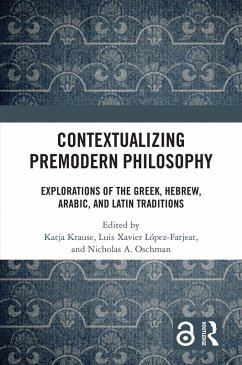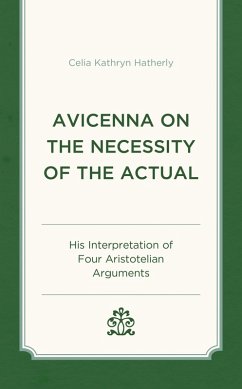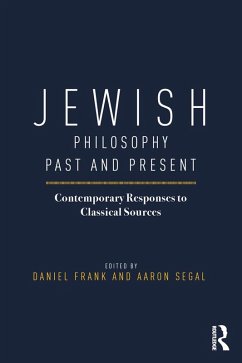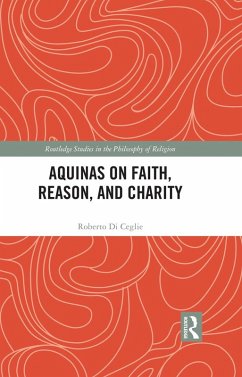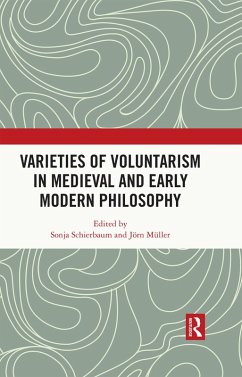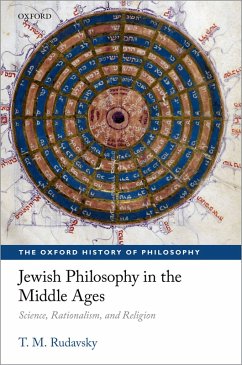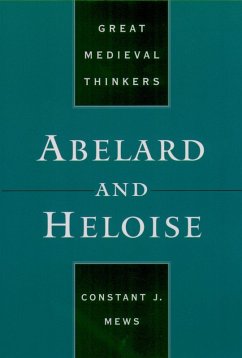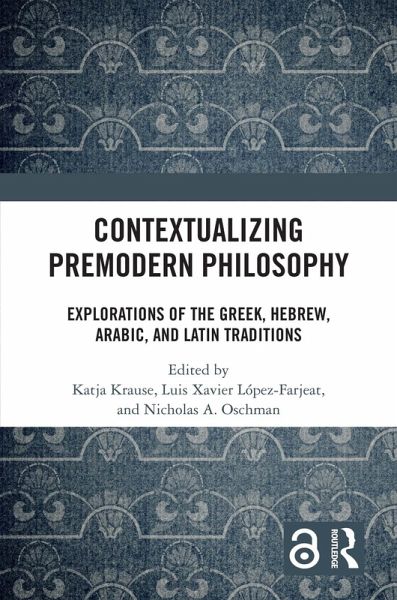
Contextualizing Premodern Philosophy (eBook, ePUB)
Explorations of the Greek, Hebrew, Arabic, and Latin Traditions
Redaktion: Krause, Katja; Oschman, Nicholas A.; López-Farjeat, Luis Xavier
Versandkostenfrei!
Sofort per Download lieferbar
0,00 €
inkl. MwSt.
Weitere Ausgaben:

PAYBACK Punkte
0 °P sammeln!
This volume brings together contributions from distinguished scholars in the history of philosophy, focusing on points of interaction between discrete historical contexts, religions, and cultures found within the premodern period. The contributions connect thinkers from antiquity through the Middle Ages and include philosophers from the three major monotheistic faiths-Judaism, Islam, and Christianity.By emphasizing premodern philosophy's shared textual roots in antiquity, particularly the writings of Plato and Aristotle, the volume highlights points of cross-pollination between different schoo...
This volume brings together contributions from distinguished scholars in the history of philosophy, focusing on points of interaction between discrete historical contexts, religions, and cultures found within the premodern period. The contributions connect thinkers from antiquity through the Middle Ages and include philosophers from the three major monotheistic faiths-Judaism, Islam, and Christianity.
By emphasizing premodern philosophy's shared textual roots in antiquity, particularly the writings of Plato and Aristotle, the volume highlights points of cross-pollination between different schools, cultures, and moments in premodern thought. Approaching the complex history of the premodern world in an accessible way, the editors organize the volume so as to underscore the difficulties the premodern period poses for scholars, while accentuating the fascinating interplay between the Greek, Hebrew, Arabic, and Latin philosophical traditions. The contributors cover many topics ranging from the aims of Aristotle's cosmos, the adoption of Aristotle's Organon by al-Farabi, and the origins of the¿ Plotiniana Arabica to the role of Ibn Gabirol's Fons vitae in the Latin West, the ways in which Islamic philosophy shaped thirteenth-century Latin conceptions of light, Roger Bacon's adaptation of Avicenna for use in his moral philosophy, and beyond. The volume's focus on "source-based contextualism" demonstrates an appreciation for the rich diversity of thought found in the premodern period, while revealing methodological challenges raised by the historical study of premodern philosophy.
Contextualizing Premodern Philosophy: Explorations of the Greek, Hebrew, Arabic, and Latin Traditions is a stimulating resource for scholars and advanced students working in the history of premodern philosophy.
By emphasizing premodern philosophy's shared textual roots in antiquity, particularly the writings of Plato and Aristotle, the volume highlights points of cross-pollination between different schools, cultures, and moments in premodern thought. Approaching the complex history of the premodern world in an accessible way, the editors organize the volume so as to underscore the difficulties the premodern period poses for scholars, while accentuating the fascinating interplay between the Greek, Hebrew, Arabic, and Latin philosophical traditions. The contributors cover many topics ranging from the aims of Aristotle's cosmos, the adoption of Aristotle's Organon by al-Farabi, and the origins of the¿ Plotiniana Arabica to the role of Ibn Gabirol's Fons vitae in the Latin West, the ways in which Islamic philosophy shaped thirteenth-century Latin conceptions of light, Roger Bacon's adaptation of Avicenna for use in his moral philosophy, and beyond. The volume's focus on "source-based contextualism" demonstrates an appreciation for the rich diversity of thought found in the premodern period, while revealing methodological challenges raised by the historical study of premodern philosophy.
Contextualizing Premodern Philosophy: Explorations of the Greek, Hebrew, Arabic, and Latin Traditions is a stimulating resource for scholars and advanced students working in the history of premodern philosophy.
Dieser Download kann aus rechtlichen Gründen nur mit Rechnungsadresse in A, B, BG, CY, CZ, D, DK, EW, E, FIN, F, GR, HR, H, IRL, I, LT, L, LR, M, NL, PL, P, R, S, SLO, SK ausgeliefert werden.




